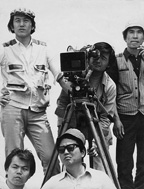Films from Japan
This is a collection of superior feature films out of Japan that feature zainichi characters. What images of zainichi emerge from their representation by Chiba Yasuki, Kato Tai, Lee Hak-in and Izutsu Kazuyuki? Red Tengi, which has yet to be shown due to various circumstances, will be screened here for the first time.
The Brick Factory Girl
(“Renga joko”)- JAPAN / 1940 (Release: 1946) / Japanese, Korean / B&W / 35mm / 63 min
Director: Chiba Yasuki
Original Story: Nozawa Fumiko
Script: Hatta Naoyuki
Photography: Nakai Asakazu
Music: Fukai Shiro
Art Director: Koike Kazumi
Cast: Yaguchi Yoko, Mishima Masao, Tokugawa Musei, Etsu-chan, Ozawa Sakae, Akagi Ranko, Tsubaki Sumie
Production Company: Nano Eiga
Distributor: Shochiku
Source: Shochiku, National Film Center
This film is based on a novel of the same title by Nozawa Fumiko published in 1940. Chiba Yasuki is a director familiar to YIDFF where his films The Story of Wu Pong (1932), set in Qing era Taiwan, and White Mural (1942), set in Okinawa, have been screened. This film focuses on Koreans living in Japan. The filmmaker’s humanism comes across in the portrayal of a girl living in a shabby tenement, the warmth of a Korean girl she meets, and the friendliness of this Korean girl’s family. The film failed to pass the censorship board and was banned from screening, perhaps for its proletarian philosophy. It was not until the end of the war that the film was released to the public.
By a Man’s Face Shall You Know Him
(“Otoko no kao wa rirekisho”)- JAPAN / 1966 / Japanese, Korean / Color / 35mm / 89 min / English subtitled version
Director: Kato Tai
Script: Hoshikawa Seiji, Kato Tai
Photography: Takaba Tetsuo
Editing: Ishii Iwao
Sound: Obi Yukio
Music: Kaburagi So
Art Director: Umeda Chiyoo
Lighting: Aoki Yoshifumi
Assistant Directors: Hasebe Toshiro, Igarashi Keiji, Mimura Haruhiko, Nanbu Hideo
Cast: Ando Noboru, Mari Akemi, Itami Ichizo, Nakatani Ichiro, Uchida Ryohei, Nakahara Sanae, Arashi Kanjuro
Producer: Masumoto Kinen
Production Company: Shochiku
Source: Shochiku, The Japan Foundation
The first Kato Tai film produced by Shochiku, he subsequently he made Opium Heights: Hell Troop Attack! (1966) and 18-year Sentence (1967) all starring Ando Noboru. Together they are widely considered to form a wartime / post-war trilogy. The core element of the film, set in the chaotic era just after defeat in the war, is the conflict between the main character, who is a doctor and landlord of a market, and a zainichi Korean group attempting to encroach upon his land. The film depicts feelings of human affection, which transcend ethnic oppositions. Kato Tai himself wrote, “I am not really prepared to address questions of ethnicity. The film is just about a man and a woman.” Truly, this film is a great masterpiece of a love story.
Red Tengi
(“Akai tengi”) JAPAN / 1979 / Japanese, Korean / Color / 35mm / 118 min
JAPAN / 1979 / Japanese, Korean / Color / 35mm / 118 min
Director, Script: Lee Hak-in
Photography: Kim Duk-chul
Editing: Suzuki Masaharu
Sound: Sugizaki Takashi
Music: J.A. Caesar
Art Director: Katagiri Takeyuki
Lighting: Yamashita Hiroshi
Assistant Director: Shimomura Yu
Cast: Obayashi Takeshi, Mabuchi Haruko, Tono Eishin, Seki Hiroko, Matsumura Tatsuo
Producers: Seto Kaname, Fukuda Motohiko, Tono Masaaki
Production Companies: Ranrusha, Ryokutosha
Source: Tenyu, National Film Center
Following The River of the Stranger (the first feature film by a zainichi filmmaker) and Aunt Shiu, director Lee Hak-in took up the murder of the female owner of a small delivery service as the subject of his next film. The 1955 incident, which occurred in Mishima City, Shizuoka, became known as the Marusho Case, owing to the false accusation of the main suspect, the zainichi Korean Lee Deuk-hyun. Despite being in the middle of a court appeal for retrial, disagreement and conflict ensued between the production team on one side and the accused, his family and his support group on the other. As a result, the film could not be shown to the public at the time.
Empire of Kids
(“Gaki teikoku”)- JAPAN / 1981 / Japanese, Korean / Color / 16mm (Original: 35mm) / 115 min /
English subtitled version
Director: Izutsu Kazuyuki
Original Story: Izutsu Kazuo
Script, Assistant Director: Nishioka Takuya
Photography: Maki Itsuro
Editing: Kikuchi Junichi
Sound: Kimura Hitoshi
Music: Yamamoto Masahiro
Lighting: Sasaki Masahiro
Cast: Shimada Shinsuke, Matsumoto Ryusuke, Cho Bang-ho, Masu Takeshi, Saki Megumi
Planning: Taga Shosuke
Producers: Hayashi Nobuo, Sasaki Shiro
Production Companies: Playguide Journal, ATG
Distribution: ATG
Source: Toho, The Japan Foundation
Izutsu Kazuyuki’s first mainstream film after a series of independent films, pink films and documentaries that received wide attention. Despite being a low-budget film, it is a powerful testament to the fiery enthusiasm of its young staff from the Kansai region, including the comedy duo Shimada Shinsuke and Matsumoto Ryusuke, who were popular at the time, and Cho Bang-ho. Fresh performances enliven this portrayal of young people, including zainichi Koreans, who spend their days fighting and carousing as members of two rival Osaka street gangs, the Kita (north) and the Minami (south). Izutsu’s recent film We Shall Overcome Someday also addresses the lives of young zainichi.
Symposium BORDERS WITHIN
Date: October 12 (Wed.), 18:30 Venue: Café Sakura
Having depicted zainichi from a wide range of perspectives as they shaped the course of film history, a group of filmmakers will gather to discuss the passion that went into making each of their films. Yamane Sadao will serve as the moderator for what promises to be a hot discussion among these original and influential veterans. We urge young filmmakers to take part in this event and freely contribute to the discussion.
- Panelists: Oh Deok-soo, Pak Su-nam, Maeda Kenji and others
- Moderator: Yamane Sadao (Film Critic)
